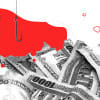Three perils unaddressed in the new budget

The proposed national budget for FY 2023-24 has been placed in parliament amid mounting prices, rising shortage of cash, and swelling debt that have all triggered livelihood distress, fiscal imbalances, and put a dent in the overall balance of payments. It is not clear how the money needed to implement this ambitious budget will be sourced. Such an increase in expenditure without the cost provision of money is a cause for concern. This concern has intensified against the backdrop of international credit rating agency Moody's downgrading the sovereign rating of Bangladesh. The budget does not provide a road map on how to get out of the ongoing inflation either.
It is interesting that the ongoing loan package of the International Monetary Fund (IMF) did not prevent Moody's downgrade, though there is a general assumption that a country is under due diligence when it agrees to an IMF programme. Although the impact of the downgrading will not be visible immediately, they are far-reaching. Following the announcement, a foreign bank announced the suspension of credit limits set for Bangladeshi banks. Many other financial institutions and banks worldwide may follow suit. Raising funds from foreign sources, both public and private, may become more difficult than ever.
The woes of debt-servicing liabilities
The government has not been able to meet its revenue targets for over a decade. Every year, a large gap remains between actual revenue collection and the proposed target. In the outgoing fiscal year, the National Board of Revenue (NBR) has a deficit of more than Tk 34,500 crore compared to the target in the first 10 months (July-April). To reach its target, the NBR has to collect about Tk 122,600 crore by the end of the year (June 30). Since the beginning of FY2022-23, however, the average revenue collection per month has been around Tk 25,000 crore.
This shortfall in revenue may cause a major downward pressure in the coming days. The government, thus, will have to increase its dependence on large amounts of loans from domestic and foreign sources to meet the deficit. Whether this funding is secured or not, failure to generate the required revenue can be a major concern. Interest payments on debt have already become the second largest item in the government's operating expenditure. The added shortfall will add to the burden of the government's debt-servicing liability. Moody's downgrade has also undermined Bangladesh's creditworthiness.
The proposed budget contains a total deficit of Tk 261,785 crore. It delineates a target of Tk 155,395 crore to be borrowed from domestic sources and Tk 106,390 crore from foreign sources (including Tk 3,900 crore of grants). Of the domestic sources, the budget estimates Tk 132,395 crore of loans to come from the banking sector. However, the banks themselves are now suffering from a liquidity crunch. In this situation, the government is left with the option of asking the central bank to print money to meet its demand. The Bangladesh Bank has already had to print Tk 70,000 crore to service the government requirement in the first 11 months of the current financial year, according to media reports.
Since the government has proposed an upturn of loans from banks by one-fourth for FY2023-24, the central bank will have to proliferate printing money, further fuelling the inflationary pressure. In Bangladesh, the money multiplier is five times. The excess money will power higher demand and raise prices, leading to inflation.
The central bank's belt-tightening measures have constricted the trade and current account deficits, dampening the much-needed import of capital machinery and intermediate goods, yet the balance-of-payment (BOP) deficit is swelling. In the first nine months of FY2021-22, the BOP deficit was about $3 billion, which in the nine months of FY2022-23 swelled to nearly $8.17 billion. This large deficit has also put the country's forex reserves under great pressure.
The greatest concern remains unaddressed, however. Recently, the deficit in the financial account of BOP has been surging on account of outflow arising out of debt servicing. As a result, the decline in forex reserves may not stop in the near future. Foreign debt more than doubled in just seven years to cross $95 billion, rising from $41.17 billion in FY2015-16. The ratio of short-term loans increased from 23 percent to 30.3 percent. During the same period, the per capita foreign debt increased from $257.47 to $557.59, as per the Bangladesh Bank data. The government's debt to GDP ratio jumped to 42.1 percent in 2023 from 28.7 percent in 2014. In this circumstance, debt servicing will become a headache.
Our forex reserves used to be flaunted. Now, the central bank's pride has been hit on both sides. After downgrading the country's rating, Moody's also downgraded the ratings of seven private banks. The adverse effects of this decision are starting to become visible. The three causes of downgrading – heightened external vulnerability, liquidity risks, and institutional weaknesses – are internal creations; there is hardly any space to blame external circumstances.
Unabated investment stagnation
Although there is barely any visible incentive to develop local industries in the proposed budget, additional VAT has been proposed. How will the ICT industry be protected if the tax increases from 5 to 25 percent for essential software like databases, operating systems, antivirus, word processors, spreadsheets, etc? Why is "Smart Bangladesh" amid the Fourth Industrial Revolution being made expensive?
According to the Bangladesh Bureau of Statistics (BBS), private investment declined by 0.88 percentage points to 23.64 percent of GDP in FY 2022-23, after staying stagnant for at least seven years. The dollar crisis has reduced import of capital machinery and intermediate goods, unhelpfully impacting investment. If there is no rapid rebound, creation of new employment may come to a standstill. Inflationary pressure will not ease either. Small, medium and cottage enterprises in particular have been hit hard by price hikes. For example, the price of domestic yarn has increased due to increase in gas and electricity prices. Every day, the price of the dollar increases against the taka, and the cost of production rises.
There is no direction in the proposed budget for a turnaround from premature deindustrialisation, diversification, enhancement of productivity, and technological catch-up. Moving away from the current consumption-expenditure-centric GDP growth model and towards sustainable green growth – centred on domestic and foreign investment – remains elusive as well.
Number of new poor may rise
The cost-of-living crisis is not addressed in the budget. As the prices of almost all goods and services have increased, the purchasing power of the common people has decreased. Inflation averaged 8.85 percent in the first 10 months of FY 2022-23, surpassing the budget target of 5.6 percent. The government still blames the Russia-Ukraine war for persistent inflation, and is proceeding with the assumption that inflation will come down automatically. Consumers are not relieved even though the prices of commodities have gone down significantly in the international market. Oil prices have been around $70-80 a barrel for a long time, but there are no signs of lowering oil prices in the domestic market as promised. The government could have reduced prices by adjusting taxes. Consumers remain hostage to a nexus of powerful middlemen, but the budget offers no structural reforms for the market system.
A recent survey by the Bangladesh Institute of Development Studies (BIDS) found that 51 percent of the total poor in Dhaka in 2022 are new poor. The employment, income, and savings of the lower and middle classes are severely affected, who are making ends meet by cutting down on their expenditure on food, education, and health. Food distribution programmes such as Food for Work and open market sales will have less food next year (3.09 million tonnes), down from 3.28 million tonnes in the outgoing fiscal year. The budget does not mention the government's strategies to curb non-food expenses such as housing rent, transport, and healthcare. The proposed hike in VAT on daily necessities like utensils, tissues, pens, sanitary napkins, etc will make survival even more difficult.
Allocations for social safety net programmes (SSNPs) are declining both as a proportion of the overall budget and the GDP. An increase of Tk 50-100 per month in an allowance is insufficient. The pension scheme for retired government employees is included in the SSNPs, taking up 22 percent of the allocation. The government has proposed changes to the fragmented, faulty SSNPs, marred with errors of inclusion and exclusion. But no funds have been specifically allocated for the preparation of databases, digital payment systems, and the selection of rights-holders.
Similarly, the proposed allocations for social expenditure such as health, education, and security have not increased.
The approach proposed in the budget 2023-24 may not create any sustainable solution for the tribulations of the poor and destitute. The government thinks that the country's poor population has shrunk to a large extent and that the ultra-poor are almost non-existent. But the reality tells a different story. Despite the questionable definition used to measure poverty, the BBS survey reveals the pace of poverty reduction to be slowing down. New poor are being created as inflation outpaces any rise in wages. The pursued poverty alleviation instruments are not capable of addressing external shocks. Added to this is the failure to create employment in the formal sector. In the absence of employment in the formal sector, the poor are forced into self-employment for survival. According to the BIDS, the rate of self-employment among the poor increased from 33.60 percent in 2019 to 38.56 percent in 2022.
The proposed national budget for FY 2023-24 is devoid of solutions to the ever-increasing structural disease of inequality. Biased policy structures have been pushing income and wealth inequality in Bangladesh. The Gini coefficient has been rising for 12 years, reaching the alarming level of 0.499 in 2022, making the pledge – taken during the Liberation War – of a society based on equity, human dignity, and social justice a distant dream.
Dr Rashed Al Mahmud Titumir is professor and chairman of the Department of Development Studies at Dhaka University.

 For all latest news, follow The Daily Star's Google News channel.
For all latest news, follow The Daily Star's Google News channel. 








Comments